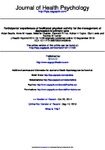Patients' views of physical activity as treatment for depression: a qualitative study
| dc.contributor.author | Searle, A | |
| dc.contributor.author | Calnan, M | |
| dc.contributor.author | Lewis, G | |
| dc.contributor.author | Campbell, J | |
| dc.contributor.author | Taylor, Adrian | |
| dc.contributor.author | Turner, K | |
| dc.date.accessioned | 2018-01-16T16:22:08Z | |
| dc.date.available | 2018-01-16T16:22:08Z | |
| dc.date.issued | 2011-04-01 | |
| dc.identifier.issn | 0960-1643 | |
| dc.identifier.issn | 1478-5242 | |
| dc.identifier.uri | http://hdl.handle.net/10026.1/10596 | |
| dc.description.abstract |
BACKGROUND: Clinical guidance recommends physical activity to manage patients with persistent subthreshold depressive symptoms or mild-to-moderate depression. However, little is known regarding the acceptability of physical activity as a treatment for depression from patients' perspective. AIM: To explore patients' views of physical activity for the treatment of depression in the context of primary care. DESIGN OF STUDY: In-depth interviews were held with 33 participants taking part in a randomised controlled trial assessing the effectiveness of physical activity for the management of depression. SETTING: Primary care. RESULTS: Most participants perceived physical activity to be an acceptable treatment for depression. The mechanisms by which physical activity could enhance mood were attributed to a number of subjective benefits including biochemical pathways, providing a source of distraction from negative thoughts, and a sense of purpose. Participants who expressed a belief that their depression was caused by biochemical mechanisms reported activity that 'raised the heartbeat' as most beneficial, while those who believed depression was situational in origin tended to state the benefits of less-aerobic activities, such as walking. Many participants reported low motivation and a lack of confidence as barriers to undertaking physical activity. These patients suggested that medication could be helpful for initiating and maintaining activity. CONCLUSION: Patients view physical activity as an effective treatment for depression. However, they vary in their views about how physical activity might impact on depression, what intensity and form of activity is necessary to enhance mood, and the barriers to undertaking activity. This variation suggests the need for GPs to elicit patients' views on physical activity as a treatment, and offer interventions that are tailored to the needs and expectations of individual patients. | |
| dc.format.extent | e149-e156 | |
| dc.format.medium | ||
| dc.language | en | |
| dc.language.iso | eng | |
| dc.publisher | Royal College of General Practitioners | |
| dc.subject | Adult | |
| dc.subject | Aged | |
| dc.subject | Attitude to Health | |
| dc.subject | Depressive Disorder | |
| dc.subject | Exercise Therapy | |
| dc.subject | Humans | |
| dc.subject | Middle Aged | |
| dc.subject | Patient Satisfaction | |
| dc.subject | Young Adult | |
| dc.title | Patients' views of physical activity as treatment for depression: a qualitative study | |
| dc.type | journal-article | |
| dc.type | Journal Article | |
| dc.type | Research Support, Non-U.S. Gov't | |
| plymouth.author-url | https://www.webofscience.com/api/gateway?GWVersion=2&SrcApp=PARTNER_APP&SrcAuth=LinksAMR&KeyUT=WOS:000290197100007&DestLinkType=FullRecord&DestApp=ALL_WOS&UsrCustomerID=11bb513d99f797142bcfeffcc58ea008 | |
| plymouth.issue | 585 | |
| plymouth.volume | 61 | |
| plymouth.publication-status | Published | |
| plymouth.journal | British Journal of General Practice | |
| dc.identifier.doi | 10.3399/bjgp11x567054 | |
| plymouth.organisational-group | /Plymouth | |
| plymouth.organisational-group | /Plymouth/Faculty of Health | |
| plymouth.organisational-group | /Plymouth/Faculty of Health/Peninsula Medical School | |
| plymouth.organisational-group | /Plymouth/REF 2021 Researchers by UoA | |
| plymouth.organisational-group | /Plymouth/REF 2021 Researchers by UoA/UoA03 Allied Health Professions, Dentistry, Nursing and Pharmacy | |
| plymouth.organisational-group | /Plymouth/Research Groups | |
| plymouth.organisational-group | /Plymouth/Research Groups/FoH - Community and Primary Care | |
| plymouth.organisational-group | /Plymouth/Research Groups/Institute of Health and Community | |
| plymouth.organisational-group | /Plymouth/Research Groups/Institute of Translational and Stratified Medicine (ITSMED) | |
| plymouth.organisational-group | /Plymouth/Research Groups/Institute of Translational and Stratified Medicine (ITSMED)/CCT&PS | |
| plymouth.organisational-group | /Plymouth/Research Groups/Plymouth Institute of Health and Care Research (PIHR) | |
| plymouth.organisational-group | /Plymouth/Users by role | |
| plymouth.organisational-group | /Plymouth/Users by role/Academics | |
| plymouth.organisational-group | /Plymouth/Users by role/Researchers in ResearchFish submission | |
| dc.publisher.place | England | |
| dc.identifier.eissn | 1478-5242 | |
| dc.rights.embargoperiod | Not known | |
| rioxxterms.versionofrecord | 10.3399/bjgp11x567054 | |
| rioxxterms.licenseref.uri | http://www.rioxx.net/licenses/all-rights-reserved | |
| rioxxterms.type | Journal Article/Review |


